
NHPRC News - November 2012
NHPRC News
November 2012
In This Issue:
Archives Leadership
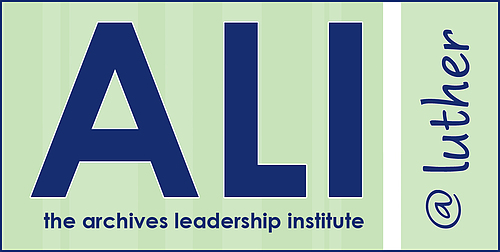
The Archives Leadership Intensive is now accepting applications for 2013. This is an opportunity for emerging and innovative archivists and records administrators to discover and share the knowledge and tools to transform the archival profession in practice, theory and attitude.
The 2013 Archives Leadership Intensive will be held at Luther College in Decorah, Iowa from June 16-22, 2013.
The program includes five elements:
- A week-long residential Leadership Intensive held on Luther College's campus;
- A focused practicum project that will connect leadership skills with action;
- A practices workshop held during the annual meeting of the Society of American Archivists;
- Global group projects that will encourage all ALI alumni to generate solutions to challenges within the profession; and
- A moderated online network experience that will serve as a virtual space for the ALI community to share and grow.
The core approach will intertwine strategic and advanced leadership thinking with a clear and purposeful archival curriculum that includes project management, strategic visioning and human resource development, strategies for born digital resources, and advocacy and outreach. This curriculum will be taught by Kathleen Roe, New York State Archives; Sharon Leon, The Center for History and New Media at George Mason University; Daniel Noonan, The Ohio State University; and Christopher Barth, The United States Military Academy at West Point.
ALI@Luther will be influenced by a steering committee of experienced leaders in the archival profession who will also serve as mentors to ALI participants. The steering committee includes Terry Baxter, Multnomah County Records Program, Portland, Ore.; Brenda Gunn, The Dolph Briscoe Center for American History at The University of Texas-Austin; Geof Huth, New York State Archives; Beth Myers, Women and Leadership Archives at Loyola University; Daniel Noonan, The Ohio State University; and Tanya Zanish-Belcher, Iowa State University.
The entire program will be facilitated by Luther Snow, consultant, author and facilitator. Rachel Vagts, Luther College Archivist and a 2010 Archives Leadership Institute alumna, will serve as ALI@Luther program director. Sasha Griffin, Luther College Digital Archivist, will serve as program coordinator. Tuition for the Institute is $500 and covers the cost of the program, lodging and most meals. Transportation will be provided from the Rochester, MN, airport as necessary. The institute provides a number of awards for tuition and/or travel assistance.
The Archives Leadership Institute is supported by a grant from the National Historical Publications and Records Commission, the granting agency of the National Archives and Records Administration. First funded in 2008, the Archives Leadership Institute seeks to bring to tomorrow's leaders the insights and understanding necessary for increasing public use and appreciation of archives.
For further information email ALI@luther.edu or visit the Institute's website at http://www.luther.edu/archivesleadershipinstitute/.
Grant Deadlines
The following Grant opportunities will be published on Grants.gov by November 30, 2012:
- Digitizing Historical Records
For projects to digitize nationally significant historical record collections and make the digital versions freely available online.
Final Deadline: June 11, 2013 - Electronic Records Projects
For projects to increase the capacity of archivists and archival repositories to create electronic records archives that preserve records of enduring historical value.
Final Deadline: June 11, 2013 - Institute for Historical Editing
For a project to improve the training and education for people preparing to be or working as historical editors.
Final Deadline: March 7, 2013 - Publishing Historical Records
For projects to publish historical records of national significance.
Two annual competitions:
Colonial and Early National Period - Final Deadline: June 11, 2013
New Republic through the Modern Era - Final Deadline: October 3, 2013 - State and National Archival Partnership Grants
For projects to strengthen archives and historical records programs in each of the states and build a national archival network.
Final Deadline: September 5, 2013
News from the Field
The '12 Election
One hundred years ago, we had ourselves a rare four-way Presidential election. William Howard Taft had claimed the Republican nomination, and Woodrow Wilson was the man for the Democrats. The Socialist Party put up Eugene Debs, and the Bull Moose Party--the Progressives--put forward Teddy Roosevelt, formerly the Republican President.
In the summer of 1912, pundits were speculating about the impact of the third political party. Edward House, who later became Wilson's trusted advisor, wrote to Governor Wilson on August 21 with this prediction:
In my opinion, the greatest asset that we have is the scare that Roosevelt is giving the conservative Republicans and I have found that my efforts proselytizing prominent Taft adherents have been successful whenever I have been able to show that a vote for Taft is a half vote for Roosevelt.
Eugene Debs had slightly different advice. Fred D. Warren, the managing editor of Appeal to Reason, reported his observations about the Bull Moose convention:
I am impressed with the importance of the 3rd party move. There is something strikingly significant in the gathering together of 14,000 men and women from all parts of the nation to declare that they no longer were republicans, thus severing the political ties of a life time. I sat within twenty feet of Roosevelt and there were times when I could have shut my eyes and readily believed I was listening to a Socialist soap boxer!
While Wilson won the overwhelming majority of electoral votes, the popular count was: Wilson 42 percent, Roosevelt 27 percent, Taft percent, and Debs percent. (Eugene W. Chafin, the Prohibition candidate won 1.4percent) Roosevelt sent the following telegram to Wilson after the election: "The American people by a great plurality have conferred upon you the highest honor in their gift. I congratulate you thereon."
You can read more about it in the Papers of Woodrow Wilson, a monumental documentary edition, edited by Arthur Link and published by Princeton University Press, and the Letters of Eugene V. Debs, edited by J. Robert Constantine and published by the University of Illinois Press, two projects supported with grants from the NHPRC.
Around the World on a Bicycle
A grant from the NHPRC to the Georgia Historical Society (GHS) helped reveal a "hidden" collection that tells the amazing story of Fred A. Birchmore. After the GHS published a list of collections processed through the grant, the son-in-law of Fred A. Birchmore contacted them because the family had been searching for his papers for years and had no idea that they had been donated. This, in turn, led to an article in Georgia History Today and Smithsonian Magazine on Mr. Birchmore's 1934-35 trip around the world - on a bicycle.
Born in November 1911, Fred Birchmore first traveled across Europe, interrupting his journey with several months of study at the University of Cologne in Germany. He then bicycled through the Alps, turned south toward Egypt, and then across Central Asia. Following this, he went the 1,300 miles of the Grand Trunk Road to Mandalay, below the Burma Road to the Malay Peninsula, through Thailand and French Indo-China. He took ships to the Philippines and resumed his ride in California, then going across the country to Athens, Georgia. The entire global trip was approximately 25,000 miles.
He called his one-speed 42-pound bicycle Bucephalus, after Alexander the Great's horse, and it is currently at the National Museum of American History. Mr. Birchmore was also known for walking down the steps of the Washington Monument-on his hands. In 1996, he ran the Olympic torch on the University of Georgia campus before it headed onto the games in Atlanta. A much beloved figure in Georgia, Mr. Birchmore passed away at the age of 100 this past April, a true American adventurer.
ACLU Processing Project Complete
At Princeton University, the Mudd Library has recently completed processing the final two series of the records of the American Civil Liberties Union (ACLU), and the entire collection is now available to the public. These materials join ACLU records long held at the Mudd Library: The Roger Baldwin Years, 1917-1950 and American Civil Liberties Union Records 1947-1995. As a whole, this collection documents the civil liberties organization's work in areas including civil rights, children and women's rights, and freedom of speech. The series belong to a third sub-group, which covers the years between 1975 and 2000. The records are of vital historical and cultural importance to the nation, and the project was supported by a grant from the National Historical Publications and Records Commission (NHPRC).
Founded in 1920, the ACLU's mission is "to defend and preserve the individual rights and liberties guaranteed to every person in this country by the Constitution and laws of the United States." The group has been integral in myriad landmark court cases since its inception. The ACLU began depositing its archives at Princeton University in the early 1950s, and it is the largest--and most used--of Mudd's public policy collections. Through the work of Adriane Hanson and with the help of several Princeton students, some 2500 linear feet were processed since June 2010, the single largest and fastest processing project in Mudd Library's history. The entire ACLU collection now spans about 4,200 linear feet.
Vermont Court Records
In 2011, the NHPRC awarded the Vermont State Archives and Records Administration (VSARA) a detailed processing grant to arrange and describe county court records from three northern Vermont counties. The primary objective of this project is to provide greater public access to Caledonia, Orleans, and Lamoille County Court records through their systematic arrangement, detailed description, and effective preservation.
By early July 2012, the project team finished processing all of the Orleans County court records. In total, the records include 122 cubic feet of case files and 585 volumes of dockets and record books. Between April 1 and July 7 when the processing was completed, the project team processed case files at an average rate of one cubic foot per 5.6 hours. This rate was nearly half of the original project estimate of ten hours per cubic foot. The project team also completed and entered the series and box descriptions for the Orleans County records into VSARA's online database. Those descriptions can now be found at:
Separate guides for the county, chancery, and supreme courts are being compiled which will include descriptive information about the courts and their records from each county. These guides will be accessible via the online series descriptions. Creation of EAD and MARC records for submission to other databases will be completed after the records of the final county are processed.
This past summer, the team processed 319 docket books and 70 record books for Caledonia County. The team continues to process volumes at a quicker pace than anticipated and this provided an opportunity to process additional dockets that are in the Archives holdings. As a result, an additional 40 years-worth of Caledonia County Court dockets (up to 1989) have been arranged and described and will be accessible to the public under this project.
In June, the court records proved a big hit at an exhibit at the Vermont History Expo. The two-day event, organized by the Vermont Historical Society, is held biennially in Tunbridge, Vermont and is consistently featured as one of Yankee Magazine's "Best of New England" events. The 2012 expo attracted over 3,600 people over the two day period.
Pan Am at University of Miami
The Special Collections branch of the University of Miami Libraries is processing and enhancing access to the Pan American World Airways, Inc. records (1,600 linear feet), a window into the birth of the modern airline industry and a valuable resource to researchers of American business, travel, and popular culture.
From its founding in 1927 through its bankruptcy and closing in 1991, Pan American World Airways, Inc. (Pan Am) served as an international leader in aviation transportation. The airline began as a small airmail and passenger service carrier between Key West, Florida, and Havana, Cuba, but over time established itself as the principal and largest international passenger carrier in the United States. Initially Pan Am only flew routes throughout Latin America and the Caribbean, but the company quickly expanded to fly long-distance global flights throughout Europe, Asia, Africa, and the Pacific Islands and Australia.
The company established industry trends, successfully imbuing the concept of international travel as romantic and exotic through its marketing campaigns. Pan Am was also instrumental during World War II, allowing government officials to fly more than 90 million miles and offering training for military pilots, navigators, and other aircrew. The company also set aviation trends with technical innovations in radio, meteorology, and navigation.
The collection includes a variety of formats and subject content. Administrative, legal, and financial records document the airline's business practices and the management of its resources. Topics range from information about babies on aircraft to military activities, terrorism, and labor negotiations. These files also contain speeches by leaders at the airline. Promotional and publicity materials illustrate the company's marketing effect on the consumer and the strategy taken with the press. The collection also has manuals and technical reports for the maintenance and care of specific aircraft, airport buildings and terminals, and other flight equipment. Logbooks of some of Pan Am's flights document airplane performance, passenger and crew data, and observations of the Pan Am flight crew. Accident files document crash, collision, and other airplane failures with detailed reports and photographs. Photograph files illustrate aircraft interiors, exteriors, Pan Am crew and events, equipment and facilities, and other subjects.
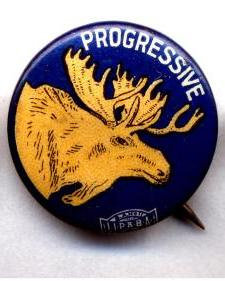 The 1912 election launched the Bull Moose Progressive Party, with Teddy Roosevelt as its standard-bearer.
The 1912 election launched the Bull Moose Progressive Party, with Teddy Roosevelt as its standard-bearer. Clifford Berryman cartoon, November 1912, How They re Acting and How They Feel. Center for Legislative Archives, National Archives
Clifford Berryman cartoon, November 1912, How They re Acting and How They Feel. Center for Legislative Archives, National Archives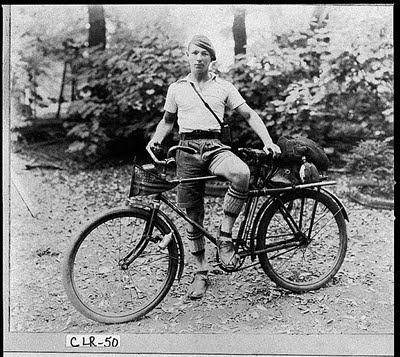 Fred Birchmore and Bucephalus, courtesy University of Georgia Archives
Fred Birchmore and Bucephalus, courtesy University of Georgia Archives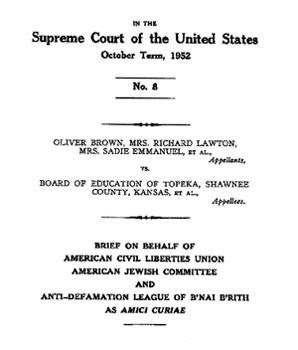 Cover of the ACLU brief (October 1952), American Civil Liberties Union Archives, 1917-1995, Reproduced courtesy of the Department of Rare Books and Special Collections, Princeton University Library.
Cover of the ACLU brief (October 1952), American Civil Liberties Union Archives, 1917-1995, Reproduced courtesy of the Department of Rare Books and Special Collections, Princeton University Library.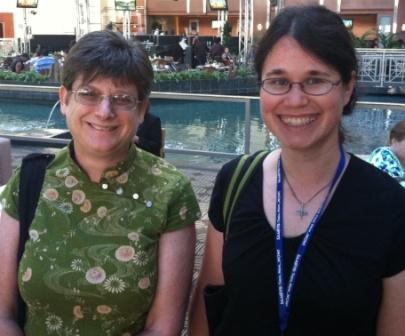 Paula Jabloner (left) and Adriane Hanson at the 2011 Society of American Archivists meeting in Chicago. Jabloner managed Mudd LibraryÂ’s first ACLU records processing project in the mid-1990s. Hanson addressed the more recent ACLU records project. Both were supported by the NHPRC.
Paula Jabloner (left) and Adriane Hanson at the 2011 Society of American Archivists meeting in Chicago. Jabloner managed Mudd LibraryÂ’s first ACLU records processing project in the mid-1990s. Hanson addressed the more recent ACLU records project. Both were supported by the NHPRC.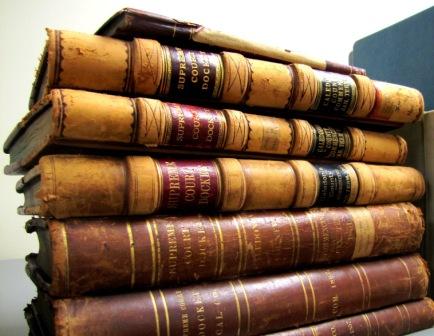 Vermont Supreme Court docket books. Courtesy Vermont State Archives and Records Administration.
Vermont Supreme Court docket books. Courtesy Vermont State Archives and Records Administration. 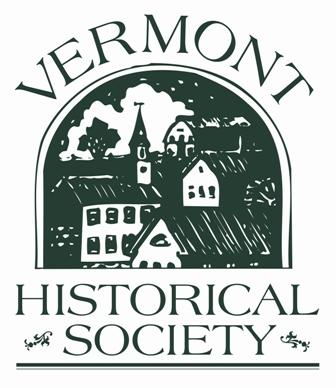
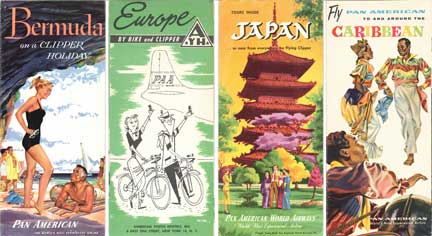 Pan American World Airways, Inc. brochuses, Special Collections, University of Miami Libraries.
Pan American World Airways, Inc. brochuses, Special Collections, University of Miami Libraries. Pan Am flight attendants, Special Collections, University of Miami Libraries
Pan Am flight attendants, Special Collections, University of Miami Libraries